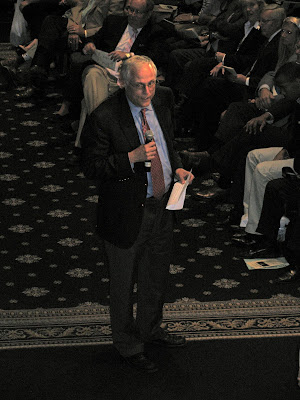"From the National Press Club in Washington, DC, this is the Kalb Report with Marvin Kalb."

The announcer's voice came over the loudspeaker, proceeded by an orchestra theme that may have been just slightly too epic for the occasion.
Tonights theme - The Great Debates, inspired by the 50th anniversary of the famous (or infamous, depending how you see it) Nixon-Kennedy debates in 1960. Guests Bob Schieffer (CBS News),
Sander Vanocur (1960 Debate Questioner), Mike McCurry (Commission on Presidential Debates), and
Janet Brown (Commission on Presidential Debates) made up the 5-chaired panel seated on a small raised platform in the front of the National Press Club's ballroom.
College students, professors, press members and various other interested parties filled the fairly large-sized room, hustling and bustling as the production assistant shouted a countdown with each minute that passed. ("4 minutes!", "3 Minutes!"). The continual interruption, however, didn't feign Mr. Gil Klein, who stood up in front of the crowded room to make the first announcement of the event (and our class feel like celebrities - "we know him!")
 |
| Professor Gil Klein |
Anyhow, getting to the point, the discussion began with a reflection upon the 1960 debates, and a comment by Mr. Sandy Vanacur (who wikipedia proclaimed "one of the country’s most prominent political reporters during the 1960s" - and this blogger doesn't question wikipedia's credentials...ever) saying that he had no idea at the time just how important the events of that day would become.
At that time, there was no "spin-room", and reporters still played a role in the questioning of candidates. It was a different era, before the once-spontaneous debates morphed into an unfortunate and poorly-disguised staged event, when anything could happen (and anything did).
[Interestingly enough, I did not know that the 1960 debates had been so controversial, that the next like-event was not until 1976. ]
The speakers/panelists spoke a lot about appearances (it is the American way). How not to wear a gray suit (Nixon's failing), how to seat oneself to avoid appearing short, how not to perspire, cough, squint, flinch, or complete any other abominably natural bodily function.
For presidential candidates, as we all know, are not human.
They also spent a lot of time on how it is these small gestures and the unscripted, unrehearsed moments that "reveal something genuine and authentic" about a candidate. In a presidential election, people vote for the person that they would be most comfortable with in a time of crisis, and it is these small insights into the candidates' humanity, they said, that help us determine if we would, in fact, trust them with our country's well-being.
What I took from the Report was an understanding that the American people are more interested in the minute details, the failings, and the human elements of a presidential debate much more than the issues at stake. I'm not certain what this says about Americans as a whole, though it seems to highlight our uniquely shallow focus - our obsession with finding the flaws in celebrity, the pitfalls of the prestigious.
It may, however, mean that in the end, we as a people are more concerned with finding the small slice of humanity in our leaders than we will ever be with their rigid set of goals or legislative promises. Personality seems to be everything, and ever since 1960, the President of the United States has not only served as our nation's leader, but as a persona on which the reputation of our country is, for better or for worse, based.
The presidential debate is not an ad, an interview, a speech, or a rally - but instead a unique amalgamation of these techniques that has, time and time again, served up not only a disheartening opportunity for critique and derision, but more optimistically, a chance for us as a people to see beneath a veneer that is so carefully built, but as history has proven, just as easily destroyed.

No comments:
Post a Comment